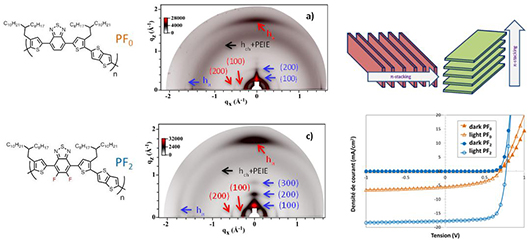The French National Center for Scientific Research (CNRS), the Institute of Chemistry and Processes for Energy, Environment and Health (ICPEES), and the Institute of Physics and Chemistry of Materials of Strasbourg (IPCMS), have cooperated with French research company, Icube to improve the PV properties of a semiconductor polymer, by changing its molecular structure.
In a study, published in the Journal of Materials Chemistry, the scientists claim they have been able to achieve an efficiency of more than 10% for an organic cell by using their innovation.
In their research, the scientists have shown the subtle links that exist between the molecular structure of one of the essential constituents of the active layer – a fluorinated electron donor polymer – and the conversion efficiency of the organic PV cell.
The authors of the study found that two essential parameters contribute to the efficiency of the cell: The systematic variation of the proportion of fluorine atoms on the polymer backbone; and the length and bulk of the aliphatic chains.
Popular content
The study has confirmed that the presence of fluorine atoms increases the cohesion between the polymer chains, and promotes the transport of charges between the polymer “boards”. It has also demonstrated that the aliphatic chains, when they increase, a fraction of the “polymer boards” is oriented flat on the substrate, thus promoting the charge transport perpendicular to the substrate.
The research group now intends to extend its analysis to all kind of polymers used in organic solar cells. The goal is to establish more universal macromolecular engineering rules to design even more efficient PV polymers.
This content is protected by copyright and may not be reused. If you want to cooperate with us and would like to reuse some of our content, please contact: editors@pv-magazine.com.



By submitting this form you agree to pv magazine using your data for the purposes of publishing your comment.
Your personal data will only be disclosed or otherwise transmitted to third parties for the purposes of spam filtering or if this is necessary for technical maintenance of the website. Any other transfer to third parties will not take place unless this is justified on the basis of applicable data protection regulations or if pv magazine is legally obliged to do so.
You may revoke this consent at any time with effect for the future, in which case your personal data will be deleted immediately. Otherwise, your data will be deleted if pv magazine has processed your request or the purpose of data storage is fulfilled.
Further information on data privacy can be found in our Data Protection Policy.